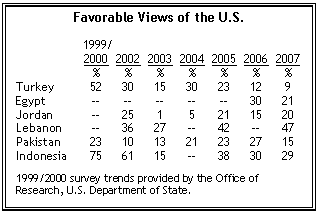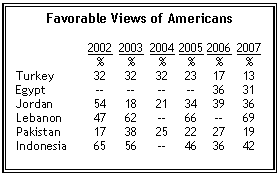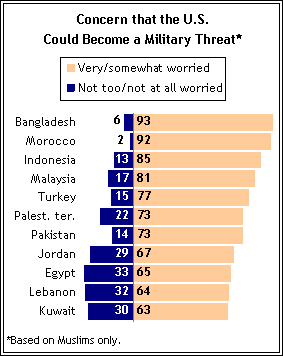by Richard Wike, Senior Researcher, Pew Global Attitudes Project

When Karen Hughes took office as undersecretary of state for public diplomacy and public affairs in the fall of 2005, her return to service in the Bush Administration brought renewed attention to the challenges of promoting America’s image abroad. To many observers, it also signaled that the administration would place greater emphasis on public diplomacy during its second term. A longtime Bush aide since his days as Texas governor, Hughes brought with her a proven track record as a communications strategist on the campaign trail and in the White House. However, as Hughes prepares to step down from her position, it is clear that America’s image problems endure.
In particular, the United States continues to receive overwhelmingly negative ratings in the one area that was the primary target of public diplomacy efforts during Hughes’ tenure: the Muslim world. Recent Pew Global Attitudes surveys show that, among Muslim publics, favorable views of the U.S. have remained scarce over the last two years and in some countries there has been further erosion in America’s image. Figure

Perhaps the most notable example is Turkey, where America’s favorability rating has plunged into single digits — only 9% of Turks currently have a positive opinion of the U.S., down from 23% in spring 2005, just before Hughes took office, and down dramatically from the beginning of the decade, when roughly half of Turks (52%) had a favorable view. Positive views of the U.S. also have declined in Pakistan and Indonesia since 2005. In the Arab world, only one-in-five Egyptians (21%) and Jordanians (20%) have a favorable opinion of the United States. In Lebanon, positive ratings of the U.S. have actually become somewhat more common over the last few years, but almost all of this improvement has taken place among the country’s Christian minority, rather than its Muslim majority (82% of Lebanese Christians now have a favorable opinion of the U.S., up from 44% in 2002).
Views of the American people also remain generally negative in many key Muslim nations, having changed very little during Hughes’ tenure. The numbers are most distressing in Turkey (13% favorable) and Pakistan (19%), but in Indonesia (42%), Jordan (36%), and Egypt (31%) ratings are only slightly better. Figure

Much of the animosity toward America — in Muslim countries and elsewhere — is driven by opposition to U.S foreign policy. The Iraq war remains unpopular and Muslim publics generally oppose U.S. and NATO efforts in Afghanistan as well. The overall U.S.-led war on terrorism is perceived negatively throughout much of the Muslim world, and overwhelmingly Muslim publics believe that the U.S. ignores their interests when making foreign policy. Moreover, there is widespread fear of American power in many countries — in every predominantly Muslim country included in the 2007 Pew Global Attitudes survey, a large majority of Muslims said they are worried the U.S. could become a military threat to their country someday (for more on opinions of U.S. foreign policy, see Global Unease With Major World Powers).
Given the depth of opposition to current U.S. foreign policy in much of the Muslim world, Hughes — and American public diplomacy in general — has faced tremendous challenges throughout her tenure at State. Despite increased funding and great energy focused on improving America’s image, in much of the world negative perceptions of the U.S. remain the norm. In the end, American foreign policy has greater influence on views of the U.S. than does public diplomacy.




